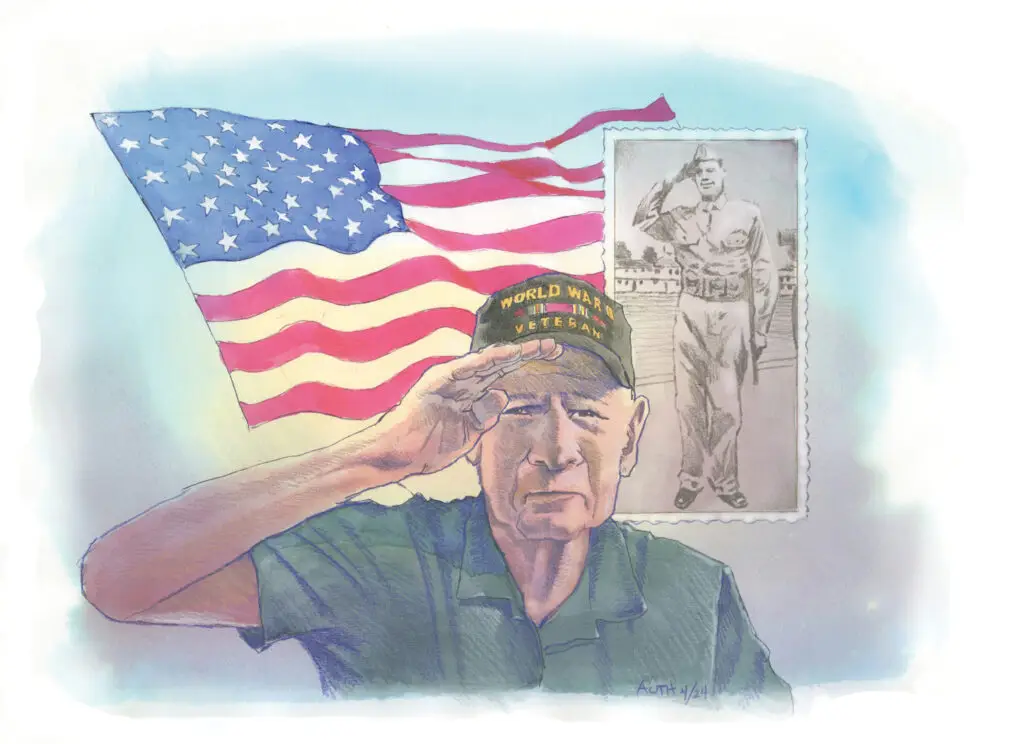
“Shoot him! Shoot him! Shoot him!” my father yelled at the screen. No one in the movie theatre made a sound. I think that’s because the audience knew the old man in the wheelchair was a veteran. Nevertheless, I was mortified by his outburst. But, I should’ve known something like this might happen when I took Dad to see “Saving Private Ryan.”
The scene that had such an effect on him was a particularly intense one. Many of you will recall it. During a skirmish with the enemy, a GI medic was shot and killed. The Americans took the lone German survivor, and made him dig a grave. Then they planned to put him in it. But Tom Hanks showed mercy and spared his life, which later in the movie would cost him his own.
My father said “Private Ryan” was the most realistic depiction of World War II he’d ever seen. It also had an unusual effect on him: The next day he talked more about the war than he ever had before. As you know, many vets rarely speak about their experiences. Since this was a window that didn’t open often, I began asking a few questions.
Initially, I inquired about a scene in the movie when an American sergeant told his men not to shoot the Nazis jumping from their pillboxes after they were doused with a flamethrower. “Let ‘em burn!” he said.
“Did things like that really happen?” I asked.
He replied directly and honestly. “Yeah, they did.” Then he continued. “And don’t think the Germans were the only bad guys. The Americans did some terrible things, too.”
“Like what?” I asked. To my surprise, he answered my question.
“Well, you know that part of the movie when the Americans were going to shoot that German who killed the medic?”
I nodded. It wasn’t too difficult to remember the scene when he yelled out loud in the theater.
“Well,” he said, “something like that happened to me. I walked up to a bunch of our guys standing over the body of a German. Seems he shot our chaplain in a firefight. So when the GIs captured him, their sergeant walked up to him and without saying a word, stabbed him with his bayonet.”
I sat in sickened, stunned silence. This was too horrible to hear. How much worse would it have been to have actually been there? For Dad, it was no movie. This really happened. What else had he seen, or for that matter, done?
At once, I realized that war dehumanizes you, regardless of what side you are on. In addition, now I understood the price my father paid fighting for our freedom. The conversation ended and we never spoke of it again. But this story has haunted me for years.
My Mom often told me that the man who returned from the war was not the same person who left. I knew physical pain accompanied my father all his life because of the wound he sustained at the Battle of the Bulge. But there were also unseen wounds that manifested themselves – outbursts of anger, excessive drinking, and nightmares. Back then it was called battle fatigue, and those affected by it were left to deal with it themselves. Some drank, some turned to Jesus, some committed suicide. Now it’s called Post Traumatic Stress Disorder, or PTSD, and we know so much more about it. There are many new treatment options that are helping our Middle East war veterans. Unfortunately, they weren’t available to help the Greatest Generation.
This Memorial Day, when we remember those heroes who made the ultimate sacrifice for our freedom, let’s not forget to honor the men who came home with an unscathed body, but a wounded soul. Men like my father, who managed to get through life despite the heavy burden they brought back from the battlefields.
Thank you for your service, Dad.
If you or someone you love needs help, call the Veteran’s Crisis Hotline at 1-800-273-8255.




